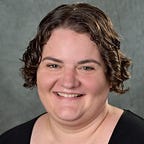Monday Motivation #54 (5/24/2021)
Happy Monday!
I signed up to take an online class this summer through Boston University. The course focuses on best practices for inclusive teaching in STEM (science, technology, engineering, math) at the college/university level. Even though I’ve been an educator for decades — and actually conduct research on engineering education and graduate studies — I can always learn more. Making time for ongoing education and professional development helps me become a better teacher and administrator, and allows me to build and broaden connections with colleagues from around the world.
If you had asked 18-year-old me what career I would have, my response would be “Spanish-speaking lawyer.” Present-day me is neither of those things, but I have a career that I love doing work I couldn’t have imagined as a teen. My pathway from high school to university administration had a lot of twists and turns; I seriously considered 14 different majors as an undergraduate — and actually earned degrees in both Political Theory and Computer Science. Taking classes in different areas helped me figure out that I was both an engineer and an educator, and helped me build the academic and professional skills I needed to succeed in the workplace.
After graduation, lifelong learning and professional development take a little more effort. While there are seemingly endless opportunities for formal and informal training, they compete with the requirements of my “day job” and my personal goals and responsibilities. So I’ve learned to be selective in where I spend my energy and time, picking just a few experiences each year that will help me build specific skills or knowledge in areas that match my interests and goals.
This week I’m sharing resources to help you think about professional development as a complement to your academic training as a graduate student, and as mechanism for lifelong learning after graduation.
Katy
Three Things to Try This Week
Learn Why — Wondering whether professional development is really worth the effort now, while you’re trying to finish classes and research? This article summarizes the importance of professional skills for STEM graduate students, particularly as they enter the job market.
Learn What — Understanding that professional development is important is the first step, but you also need to know exactly what’s involved in making a strategic plan for your non-technical, non-academic training. This post offers some great, detailed suggestions for how to think about your own interests, needs and goals and use that information to build a professional development plan.
Learn How — In academia, the “Individual Development Plan” is a common way to record and refine your professional development goals, and to track progress towards reaching them. Learn more and build an IDP for free here.
More Resources
- Interested in the summer course I’m taking? It’s part of the NSF-funded Inclusive STEM Teaching Project and is offered as a free, Massive Open Online Course (MOOC) from June 15th — July 27th, 2021.
- The MSU Graduate School offer regular professional development opportunities. Want to explore options beyond campus? Check out this searchable database of opportunities compiled by The Council of Graduate Schools.
- Relax and spend some peaceful moments enjoying this sand-and-stone artwork.
